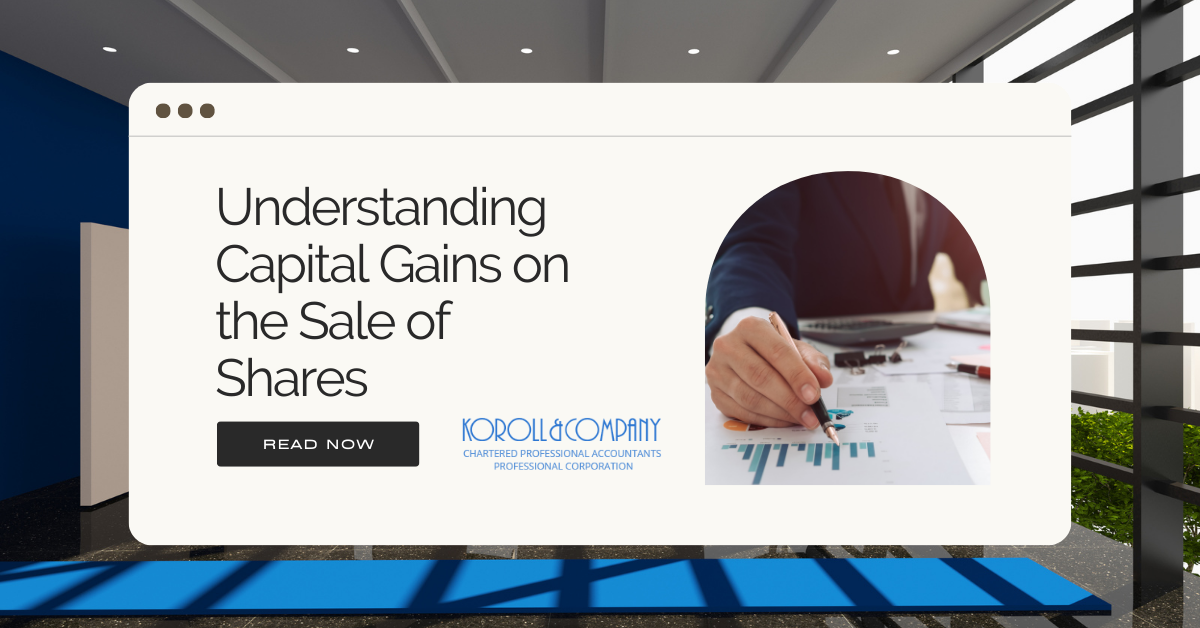 There are several different tax implications when you sell shares that you have in a business. Today, we’re going to look at one of those tax implications - capital gains.
There are several different tax implications when you sell shares that you have in a business. Today, we’re going to look at one of those tax implications - capital gains.
When you sell shares, it can result in either capital gains or capital losses. Capital gains refers to the profit made by an investor when they sell their shares at a higher price than they originally purchased them for. Capital losses on shares are incurred when an investor sells shares in a business for less than they originally paid for them.
Capital gains are subject to taxation, which is important to consider this when selling shares. It’s also important to know that capital gains and losses are subject to special rules.
Specifically, only a portion of your capital gains are included in income. Currently, that portion is 50%. Similarly, you can only deduct 50% of capital losses and these allowable capital losses can only be used to offset taxable capital gains.
In addition to these special rules, Canadians may also benefit from the lifetime capital gains exemption (LCGE) if the shares are qualified small business corporation shares. This means that:
- The shares must be for a business that is a Canadian-controlled private corporation (CCPC). Partnerships, a sole proprietorship and public corporations won’t qualify.
- 90% or more of the assets of the corporation must be used in active business in Canada or be shares /debt invested in a connected corporation.
- In the two years before the sale, you must be able to attribute 50% or more of the corporation's asset value to active business carried out in Canada or shares/debt invested in a connected corporation.
Finally, it is also generally required that no other person than the person selling the shares can have owned the shares.
The LCGE is an exemption that can be applied to any net gains received on the sale of qualified small business corporation shares, as well as:
- Qualified farm property
- Qualified fishing property
- Reserves brought into income in a given tax year from either of the above
The sale of small business assets, such as a building, does not qualify for the LCGE. However, you can roll over business assets into a corporation and then sell shares.
The amount of the exemption depends on the type of property. For qualifying shares, the LCGE is $913,630 of capital gains for 2022 and $971,190 for 2023. But remember, only 50% of capital gains are taxable. That means you’ll shelter up to $456,815 in 2022 or $485,595 in 2023 on your taxable capital gains.
Example #1
Last year, you sold small business corporation shares and made a profit of $950,000. Without the LCGE you would have to pay taxes on $475,000 (50% of $950,000). With the LCGE you can reduce the profit by $913,630.
So you would only pay taxes on $18,185 (($950,000 - $913,630) x 50%).
As the name implies, the lifetime capital gains exemption is a cumulative lifetime limit. That means you can use the exemption multiple times, until you reach the maximum amount.
If you have used the capital gains exemption before, you must reduce your available exemption limit by the amount previously applied.
Example #2
You sold small business corporation shares for a profit of $400,000 in 2021. That means you only used $400,000 of your LCGE. So you can apply the remaining $571,190 ($971,190 – $400,000) to future profits.
If you need help determining whether you qualify for the LCGE or wish to apply, book a consultation with the Koroll & Company team of chartered professional accountants today.






